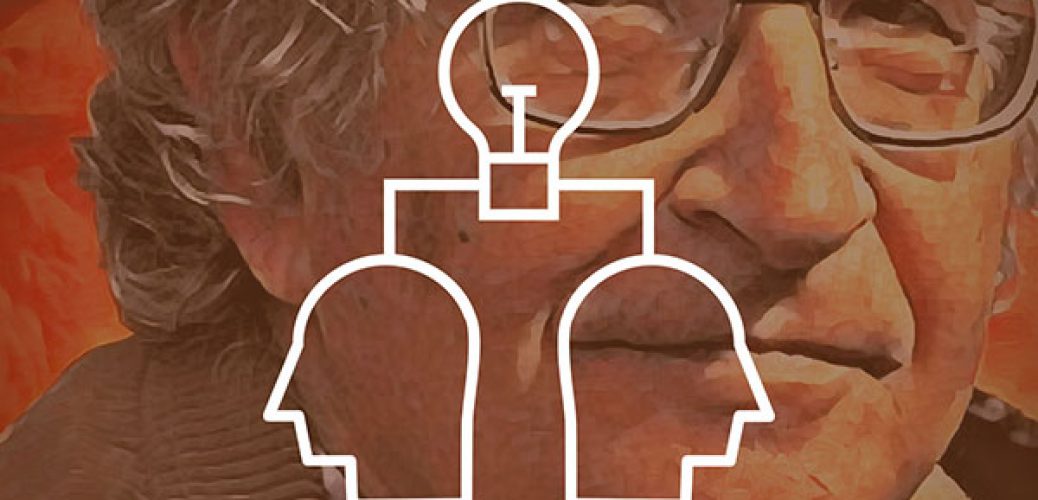Episode 1 – Noam Chomsky On Communication As An Educational Responsibility
Podcast: Play in new window | Download (Duration: 9:35 — 13.2MB) | Embed
Subscribe: Apple Podcasts | Google Podcasts | Stitcher | Email | TuneIn | RSS
We sit down and discuss the nature of communicating one’s work with Professor Noam Chomsky and find out that the role of the audience may be more important than that of the speaker.
EPISODE CREDITS
Guest Starring Professor Emeritus Noam Chomsky
Produced & Hosted by Adam Greenfield
Executive Produced by Patrick Yurick, Instructional Designer – MIT OGE
Executive Produced by Heather Konar, Communication Director – MIT OGE
Special thanks to the following editors who provided us invaluable feedback that aided in the development of this show:
Christopher O’Keeffe, Co-Founder of Podcation
Kristy Bennet, Manager – MIT Women’s League
Jennifer Cherone, Phd Candidate – MIT Burge Laboratory
Erik Tillman, Phd, Formerly of the Kim Lab & Currently A Fellow at Vida Ventures, LLC
The Great Communicators Podcast is a part of Gradcommx. Gradcommx, targeted at enhancing research communication, is the first offering of Gradx – a professional development project created for the graduate student population at the Massachusetts Institute of Technology by the Office For Graduate Education.
MUSIC & SOUNDS
“All The Best Fakers” by Nick Jaina is licensed under a Attribution-NonCommercial 3.0 International License (http://freemusicarchive.org)
“Stilt” by Blue Dot Sessions is licensed under a Attribution-NonCommercial License (http://freemusicarchive.org)
“Alchemical” by Blue Dot Sessions is licensed under a Attribution-NonCommercial License. (http://freemusicarchive.org)
“Cloud Line” by Blue Dot Sessions is licensed under a Attribution-NonCommercial License.
“Deliberate Thought” Kevin MacLeod (incompetech.com) is Licensed under Creative Commons: By Attribution 3.0 License http://creativecommons.org/licenses/by/3.0/
EPISODE SCRIPT
ADAM GREENFIELD
Welcome to The Great Communicators Podcast presented by The MIT Office of Graduate Education, a professional development podcast expressly designed to bring lessons from the field to our graduate student researchers.
My name is Adam Greenfield and I’m pretty sure it’s no secret just how important a role the audience plays in any type of communication. But in this episode, I want to flip that around a little bit and focus on what the speaker’s equally important role is to the audience’s understanding of a concept or idea.
When I first began working on this series, I somewhat expected to get specific answers and direction on what effective communication looks like. After all, the people I planned to speak with have a significant amount of experience and exposure and knowledge when it comes to communication. But after speaking with this episode’s guest, I learned perhaps less is more.
Speaking of, our guest really needs no introduction but I’m going to give one anyway. He’s a world-renowned speaker, scientist, philosopher, and political activist, to name just a few things. Really, the list of accomplishments and hats he’s worn over the years…
NOAM CHOMSKY
Every single one.
ADAM GREENFIELD
…could go on and on.
NOAM CHOMSKY
Classic formulation, back to the 17th century is that experience conforms to the modes of cognition.
ADAM GREENFIELD
That wisdom-filled voice you just heard?
NOAM CHOMSKY
That’s…
ADAM GREENFIELD
That’s Noam Chomsky.
NOAM CHOMSKY
That’s the basis for even the most elementary experiences, and when we talk about more complex matters… [FADE OUT]
ADAM GREENFIELD
I have to admit, at first I was a bit nervous about talking to Professor Chomsky. Here’s this internationally respected man who’s been the voice of immense knowledge and powerful ideas for many, many years… and for a brief moment in time, he’s gonna know my name. That’s kinda heavy.
But as I thought more and more about the reasons why Professor Chomsky would be a great guest for the show, all of that anxiety faded. Over the years, Professor Chomsky has been in front of countless people and is tasked with connecting with his audiences in many different ways. I feel like this is just one reason that makes him a bit of an expert on the topic of communication.
Now, whether or not Professor Chomsky considers himself an expert on the subject is irrelevant. What matters to him most is with great knowledge comes great responsibility.
NOAM CHOMSKY
Well, I think it’s up to people who have- people like us who happen to have a degree, a substantial degree, of privilege- privilege automatically confers responsibility, it means you can do things that others can’t. And part of that responsibility is to create a public environment in which people are offered the opportunity and encouraged to pursue their interests and concerns without distortions of institutional and other kinds of constraints. In the educational system that means, in the classroom following advice that former faculty member here, Viki Weisskopf, expressed very well, that the purpose of the lectures is to help- it doesn’t matter what we cover, it matters what you DIScover. That’s the purpose of education, and that extends to other aspects of social life, as well.
ADAM GREENFIELD
In Professor Chomsky’s time, he’s also communicated ideas in multiple mediums, from interviews to articles to documentaries, and even animated videos based on recorded interviews he’s done. It made me wonder if he had a preference on what the most effective communication tool is when it comes to an audience and why he felt that way.
NOAM CHOMSKY
Personal discussion, face to face. I just think it’s a natural human characteristic to want to be with people directly rather than through some alienating medium.
ADAM GREENFIELD
Well, we’re off to an ironic start, it seems, since I was talking to him online. However, I actually can appreciate this method of connecting with an audience. Seeing an audience’s facial expressions or body movements can allow you, the speaker, to determine how much of an effect you are having and if the audience is understanding you.
Our conversation then shifted to the subject of political rhetoric, something that came up in an article I read prior to our talk. At one point in the article he alluded to the idea that communication was not about persuasion but about creating a path for the listener to come to an understanding on their own.
NOAM CHOMSKY
I’ve always held that as a belief and I can’t claim originality for that sentiment. It’s a paraphrase of a comment on the nature of education by Wilhelm von Humboldt, an early 19th century founder of- a great humanist and the founder of the modern research university. He said we should not think of education on the model of pouring water into a vessel but rather laying out a string along which the student can find his or her own course in developing their creative capacities and their capacity to inquire and create themselves. So there’s a structure but the important thing is discovering not memorizing.
ADAM GREENFIELD
In regards to Professor Chomsky’s own rhetorical activities, it seemed pretty relevant, then, to find out what the driving purpose behind them is and what he hopes to accomplish with them.
NOAM CHOMSKY
Well there’s an ideal, and there’s reality, which may not be the same. But, the ideal would be to encourage people to be able to think for themselves and to explore the issues that are partially laid out and outlined in the course of the process of interaction. The reality may be- and shouldn’t be- efforts to try to induce people to be able to accept your own point of view and that tension is always there.
ADAM GREENFIELD
You know, this “lead a horse to water” idea is actually a really interesting approach. It seems to create a balance between the speaker and the audience, as well as puts a responsibility on the speaker to effectively lead an audience to gather new knowledge on their own. On the other side is a responsibility on the audience to put in an equal amount of effort to reach a common understanding.
And while I think this method of communicating and connecting with an audience has a ton of merit, it could also be difficult to pull off. On one hand there’s a necessary faith in the audience but on the other hand, your role is to communicate. Do that well and your audience will find their own way to the water.
Thanks for listening to The Great Communicators Podcast brought to you by The MIT Office of Graduate Education. My name is Adam Greenfield, and feel free to talk amongst yourselves.
LISTEN TO MORE EPISODES



2thinkpad
January 12, 2022 @ 10:21 pm
1establishment
gay chat washington state
January 14, 2022 @ 12:33 pm
live gay chat lines https://bjsgaychatroom.info/
alamosa gay dating sex
January 14, 2022 @ 1:38 pm
indianapolis gay dating https://gaypridee.com/
gay sissie video chat
January 14, 2022 @ 7:02 pm
free gay video chat sites https://gaytgpost.com/
how much is membership for gay dating sites
January 15, 2022 @ 12:03 pm
sugar daddy gay dating app https://speedgaydate.com/
my vegas slots free chips
January 28, 2022 @ 4:35 pm
zynga wizard of oz slots https://2-free-slots.com/
nasty slots
January 28, 2022 @ 8:00 pm
bowser slots mario party 2 https://freeonlneslotmachine.com/
slots machine
January 29, 2022 @ 12:24 am
central vally slots https://candylandslotmachine.com/
filthy rich slots free
January 29, 2022 @ 5:24 am
500 nations free slots https://pennyslotmachines.org/
slots free games
January 29, 2022 @ 8:30 am
river slots download https://slotmachinesworld.com/
deep dish western slots
February 3, 2022 @ 4:15 pm
infinity slots https://slotmachinesforum.net/
500 nations free slots
February 3, 2022 @ 8:55 pm
video slots free https://slot-machine-sale.com/
free coins hot shot slots
February 4, 2022 @ 12:46 am
river slots sweepstakes https://beat-slot-machines.com/
sharknado slots in vegas
February 4, 2022 @ 5:26 am
adult slots https://download-slot-machines.com/
fa fa fa slots
February 4, 2022 @ 7:39 am
gossip slots tournament https://411slotmachine.com/
all free 777 slots games
February 4, 2022 @ 12:26 pm
konami slots download https://www-slotmachines.com/
vagas slots
February 4, 2022 @ 1:50 pm
pop slots https://slotmachinegameinfo.com/
steps to writing a dissertation
February 10, 2022 @ 7:01 pm
dissertation service https://buydissertationhelp.com/
dissertation assignment help
February 11, 2022 @ 3:54 pm
british dissertation help https://dissertationwriting-service.com/
doctoral dissertation writing help me
February 11, 2022 @ 8:02 pm
phd dissertation writing help https://help-with-dissertations.com/
custom dissertation writing help
February 12, 2022 @ 12:11 am
tips for writing a dissertation https://mydissertationwritinghelp.com/
dissertation help ireland analysis
February 12, 2022 @ 3:45 am
dissertation writing help https://dissertations-writing.org/
help in dissertation
February 12, 2022 @ 5:32 am
how long is a phd dissertation https://helpon-doctoral-dissertations.net/